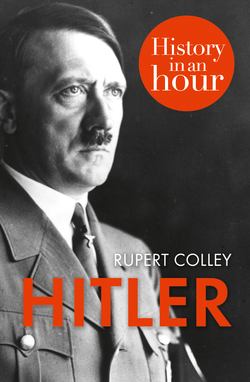Читать книгу Hitler: History in an Hour - Rupert Colley - Страница 7
На сайте Литреса книга снята с продажи.
ОглавлениеHitler the Youth
Hitler, never enamoured with school, left at sixteen. His mother was disappointed but Adolf had inherited his father’s obstinacy and Klara was too soft to assert her authority. Hitler looked back on his years of education with an ‘elemental loathing’. Alois had left his family comparatively well off and Hitler, free of his father’s bullying and expectations, devoted his efforts to leading a life of idleness. Living in a flat in the centre of Linz, Hitler indulged in his painting by day and his love of the theatre and opera by night. Closeted from the real world by his mother, finding work was never high on Hitler’s agenda.
In Linz Hitler made friends with a young man called August Kubizek, or ‘Gustl’. They became friends through their shared love of the operas of Richard Wagner, and while Hitler dreamt of becoming a great artist, Kubizek dreamt of becoming a conductor. In the evenings they would dress up and enjoy the opera or the theatre, but during the day, while Kubizek worked at his father’s upholstery workshop, Hitler lounged around, daydreaming. Kubizek was the compliant one of the two – while Hitler voiced his opinion on everything, whether good or bad, and sometimes with unnerving passion, Kubizek quietly listened.
Kubizek noted how Hitler fell in love with a girl called Stefanie, but despite his overbearing arrogance in all other matters, he was too painfully self-conscious to try to strike up a conversation with the subject of his affections.
In early 1906, aged sixteen, Hitler visited Vienna for the first time. Staying only two weeks he returned to Linz which now seemed small and provincial in comparison. Hitler decided to apply for a place at Vienna’s Academy of Fine Arts and, in September 1907, despite his mother’s reluctance and aided by a generous loan from his aunt Johanna, he moved to Vienna. Despite passing the initial exams, the would-be artist failed to secure a place. Of the 113 applicants only 28 passed so there was no shame involved but Hitler saw it as a failure and it struck him like a ‘bolt from the skies’. His examiners encouraged Hitler to concentrate on architecture instead.
Before Hitler left for Vienna, he and his sister, Paula, had learnt of their mother’s breast cancer. Towards the end of 1907, Hitler received word that his mother was dying. He rushed back to Linz and nursed her, devotedly, through her final days. She died on 21 December 1907, aged only forty-seven. According to his mother’s Jewish doctor, Edward Bloch, Hitler was with her as she died. ‘I have never seen anyone’, wrote Dr Bloch later, ‘so prostrate with grief as Adolf Hitler.’ Later, Hitler presented the good doctor with one of his paintings. In Mein Kampf Hitler wrote of his parents: ‘I had honoured my father but loved my mother.’ Hitler worshipped his mother and she was perhaps the only person he ever loved. Following her death, Hitler’s contact with his family rapidly dwindled.
Hitler returned to Vienna in February 1908, but found that he was missing his only friend, Kubizek. He wrote to Kubizek’s father to ask him allow his son to join him in the city, from where he could pursue his ambition to become a conductor. Kubizek Senior, who hoped that his son would follow him into the upholstery trade, reluctantly gave in. On 22 February, August Kubizek arrived in Vienna to be reunited with his friend.
Kubizek applied for a place at the University of Music and Performing Arts, Vienna and was immediately successful. Kubizek assumed his friend had already started his studies at the Academy of Fine Arts – Hitler had not told anyone of his failure to gain a place. Eventually the truth came out and Hitler, beside himself with rage on telling of his lack of success, blamed everyone but himself.
While Kubizek studied, Hitler slept, daydreamt and came up with grandiose plans that came to nothing. In a fit of enthusiasm he began writing the libretto for an opera along Wagnerian lines, but the enthusiasm soon petered out. In October 1908, Hitler applied again for a place at the Academy of Fine Arts and again failed, this time at the initial stage. Again, he kept his failure to himself.
On finishing his first term, Kubizek returned home briefly to Linz. When he came back to Vienna in November 1908 Hitler had moved out. He had left no forwarding address. Kubizek would not see his friend again for another thirty years.
